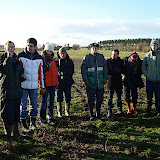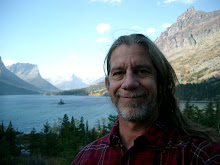We all jump into a couple of Findhorn buses and went about four miles as the crow flies up to a farm to do some work this morning @ EarthShare. The farm is actually two working farms that cooperate with each each, rotating fields between the crops that EarthShare uses to grow organic vegetables that provide for about 2000 families via a "garden box" program and Nick & Pam's farm that uses the fields to produce grain for their sheep, milk cows, and chickens.
Once we got on the field we do our normal "tune in", e.g. we use this group tool all the time before we do any job - just taking the time in the group to join hands feel our surroundings and visualize the task at hand, how much fun it is going to be, and then off we go.
We split up into several different groups, potting chives, picking carrots, sorting potatoes, or in my case I picked cabbage. There was also a group that had to tend to a minor disaster and move 150 sacks of potatoes.
When we first got to the farm it was sunny and windy, but pleasant working conditions. Within the hour, the clouds and rain moved end, but we all were able to finish our tasks, relax in the hay for a bit and then "tune out", e.g. join hands and reflect and the good job that was done and appreciate all the folks that allowed this to happen.
We then went to the farm house and talked with Nick, who was proud to show off a new arrival, a calf that was born this morning at 8am and was doing very well. The sell the eggs, wool from their sheep (their sheep are white, brown, white, & gray) is spun and knitted in to garments by local weavers using the natural wool color, and cheese (natural unpasteurized traditional Scottish cheese) from the cows milk. The cheese is about 80% of the farms income and it is very, very, very good cheeses, two types one was sweet milk, but the other escapes me.
Even with all of this going for this farm, on 90 acres (or about 30 hectares) they are struggling to make it. Most farm land is not owned by the farmers on them, this is a major expense and it limits what changes that can be made to the property that could greatly benefit the farm by using permaculture techniques to improve the surrounding ecology. Pam is one of four natural cheese makers operating in Scotland, the main reason is due to the over bearing regulations that have been placed on these types of producers. The average age of farmers/producers/craftfolks in Scotland is 57 years old.
What will our societies do once these practices are no longer part of our ways of life, providing individuals, our children & grandchildren with foods with the superior nuturing foods. These community supported farms also provide a place for community in sharing some of the activities required to operate a farm, e.g. clearing fields of detrimental weeds by hand (no petro-chemicals!).
Great experience, but it tears you up and is frightening to think about this type of loss.
 |
| EarthShare Farm |

No comments:
Post a Comment